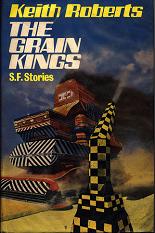Don’t tell me you pulled the “summon science fiction fandom’s barely repressed inferiority complex spell” as a response to Adam Roberts’ criticism of this year’s Hugo shortlist?
Fandom, look at the 2009 Clarke novel shortlist. Do you know why that list is better than yours? It’s not that its every novel is a masterpiece—far from it (although it seems to me regretable that you couldn’t you vote books as good as The Quiet War, House of Sons or Song of Time onto your shortlist.) But some of the books on that list fail, no question. Martin Martin’s on the Other Side, for instance, is a mediocre novel. But (and this is the crucial thing) it’s a mediocre novel trying to do something a little new with the form of the novel. It’s an experiment in voice and tone, and ambitious in its way. The novels on the Hugo shortlist—except Anathem, as I mentioned—try nothing new: they are all old-fashioned: formally, stylistically and conceptually unadventurous.
Oh, you did…
Now, I assume Mr. Roberts didn’t intend to come across as arrogant and hectoring to his primary audience, because very few people so willfully attempt to ankle-shoot their own career, even the ones with an academic aerie such as Mr. Roberts possesses. I suspect he believed he was being stern but fair. However, I also suspect that science fiction fandom, not in fact being comprised of students who have to sit for a lecture in order to graduate, may have its own opinions on the matter. In the real world, people don’t like being told, while being gently and paternalistically patted on the head, that they’re goddamned idiots. Especially from someone who then turns around and hopes to sell them a book.
Dear. As Niall says, I know which author I want to read more based on these posts, though both in their own way are rather on the annoying side. Scalzi’s for the pandering, Roberts for the somewhat patronising form he puts his complaints in.
Which, as complaints go, aren’t all that new or interesting. That the Hugo Awards are conservative and often go to mediocre works is a complaint I’ve heard as long as I’ve been online and following sf newsgroups and blogs — which is — blimey — almost fifteen years now. Look back at the history of the Hugos and it’s always been that way, going for the Heinleins rather than the Disches. However, the awards did used to have a much better track record of getting both the popular and the criticially acclaimed works. So what changed?
My theory, which is mine, is that science fiction got too big, while the Hugo voters stayed largely the same. For a striking example, compare the 1977 and the 1992 edition of the Encyclopedia of Science Fiction and see how much the genre had expanded in less than fifteen years, how much bigger, complex and diverse it had become. Even for professional critics or reviewers it’s almost impossible to keep up, let alone for “mere readers”. Sure, you can filter to a certain extent, select for books with “buzz”, well known authors, promising newcomers undsoweiter, but you can’t really expect this from people who read for pleasure, not work. The Hugo after all is voted for by everybody who has a Worldcon membership, not a professional jury. And there’s the rub.
You see, the nominations for the 2009 Hugo Awards were voted on by just 799 voters. The People’s Choice Awards this is not, the price of a supporting membership being a high barrier to entry. What we got then with the Hugos is a self-selecting group of people, many with the same sort of tastes (which in many cases were formed some time ago…). This group simply isn’t big enough or representive enough of the sf readership as a whole to accurately represent the sf zeitgeist, nor the kind of jury that would see it as its remit to look for the sort of experimental, cutting edge works that Adam Roberts want it to be.
The Hugo Awards represent the tastes of a certain kind of sf fan, nothing more and nothing less. The novels it selected for the shortlist are exactly the kind of novel it likes and not at all that different from the kind of novel it has been rewarding from the start. Which is the biggest flaw in Roberts plea: he might find the works selected this year mediocre or want the voters to vote for better, more innovative novels, but are the Hugo voters actually looking for this? My guess would be not.
There are better ways to “improve” science fiction’s image in the wider world than to harass the Hugo voters. Ironically, Roberts himself is doing that already, through his work as a critic and author, engaging readers and potential readers of science fiction outside of its traditional venues. So in a way is Scalzi, through his blog. It’s just a pity they’re working at crosspurposes…

